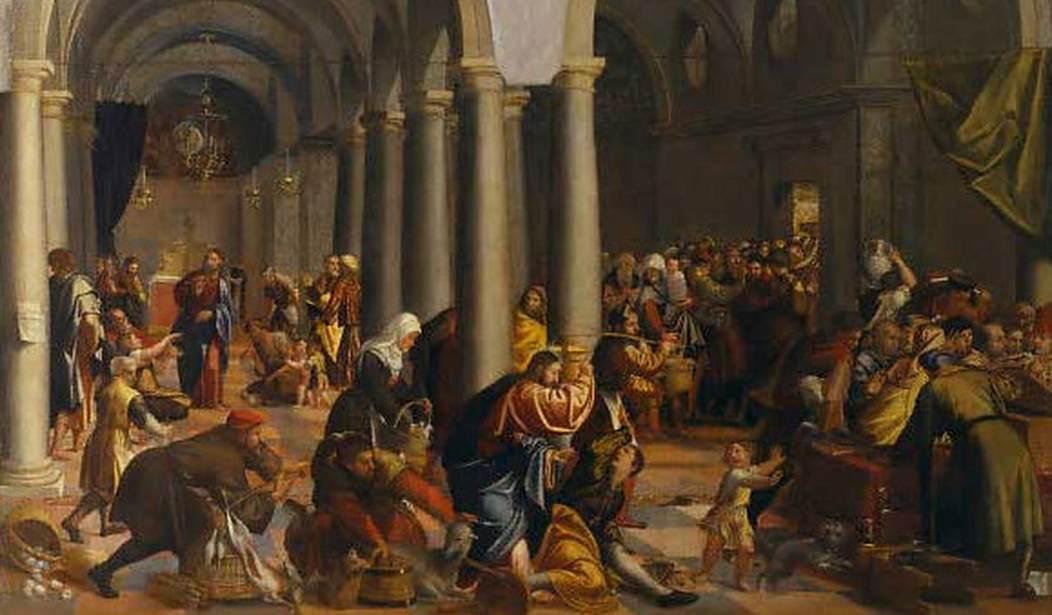This morning’s Gospel reading is John 2:13–25:
Since the Passover of the Jews was near, Jesus went up to Jerusalem. He found in the temple area those who sold oxen, sheep, and doves, as well as the money changers seated there. He made a whip out of cords and drove them all out of the temple area, with the sheep and oxen, and spilled the coins of the money changers and overturned their tables, and to those who sold doves he said, “Take these out of here, and stop making my Father’s house a marketplace.” His disciples recalled the words of Scripture, Zeal for your house will consume me. At this the Jews answered and said to him, “What sign can you show us for doing this?” Jesus answered and said to them, “Destroy this temple and in three days I will raise it up.” The Jews said, “This temple has been under construction for forty-six years, and you will raise it up in three days?” But he was speaking about the temple of his body. Therefore, when he was raised from the dead, his disciples remembered that he had said this, and they came to believe the Scripture and the word Jesus had spoken.
While he was in Jerusalem for the feast of Passover, many began to believe in his name when they saw the signs he was doing. But Jesus would not trust himself to them because he knew them all, and did not need anyone to testify about human nature. He himself understood it well.
Note: Today's Lectionary actually offers a variety of readings for this weekend's Masses. We have either this Gospel reading above or two versions of the Gospel story of the Samaritan woman at the well. We also have two different epistles from Paul, and for good measure three readings from Exodus, two of which are different edits of the same story. As such, I'm not sure what I'll hear today, let alone anyone else, but I hope this will prepare us all for the Holy Spirit nonetheless.
This Gospel reading spoke to me the most this morning, perhaps at first because of the way in which John writes about Jesus' knowledge of human nature. That is itself reflected in Jesus' attack on the moneychangers in the temple and His warning about the marketplace. That too speaks to human nature, both then and in the present, and about the nature of commitment and covenant.
In a recent reflection, we discussed the deeper meaning of Genesis 15 and the tradition of blood covenants. (Genesis 15 is not among today's readings.) In that scripture, God calls Abraham to collect five different and specific animals for a sacrifice, which Abraham does himself. Abraham then sacrifices the animals according to the custom of covenants at the time, but rather than both passing between the animals and having the blood debt on both parties, God goes through alone -- a sign that His blood will sustain the eternal covenant of salvation.
The earlier reflection covered that aspect of the covenant in Genesis 15, but in light of today's Gospel, we should focus on Abraham's contribution to it. The Lord promises Abraham land and a nation so great as to be uncountable, and Abraham asks how he is to know that the land and nation will be his. The blood covenant seals this promise and the Lord accepts all of the blood debt that would be incurred by its breaking, but Abraham is not entirely passive either. The Lord does not magically produce the animals necessary for a blood sacrifice; Abraham has to go out and get them, and they have to match up to the Lord's specifications. Abraham didn't just nip out to Sacrifice Depot or AnimalMart; he had to work directly on producing the necessary sacrifice.
Consider this in light of the temple marketplace in today's Gospel reading. The temple is meant for sacrifice in the same manner as Abraham personally provided in Genesis 15 and again when the Lord tests him by calling for the sacrifice of Isaac. The point of the sacrifice at the temple is to make it personal and to make it sincere. Given the negative description by John in this passage, the temple sacrifice by this stage appears to be more like Sacrifice Depot -- a conveniency rather than a sacrifice, and a kind of box-checking rather than an effort of the heart. It even featured moneychangers so that travelers could buy their sacrifice rather than bring their own to ask for atonement for the Lord, perhaps akin in some way to an ATM.
Seen in that way, one can understand why Jesus drove the entire industry out of the temple, at least temporarily. It's not that the people sacrificing at the temple were all insincere or hypocrites, but that they didn't have any real commitment to atonement. This sounds more like a symbolic act, and one that created profit for the merchants rather than love for the Lord.
This also ties into Jesus' challenge about the temple itself. Indeed, He was the temple, but even more, it's an observation about the temple under construction in this passage. Jeremiah had warned before and during the Babylonian onslaught of Jerusalem that the city would fall if the Judeans did not repent of their sins and returned to trust in the Lord and His mission. The Judeans scoffed at the warning, declaring that the Lord would never allow His temple to fall into the hands of the unbelievers. They preferred to treat the temple as an idol, and almost as a hostage, while the Judeans refused to follow the Lord's laws and commands.
The sacrifice practice at the temple in this passage parallels that history. It's lip service to the Lord, not true obeisance to the Word and to His lordship. It's doing just enough within the letter of the law to get by. The temple authorities who should have instructed the people on the true nature of sacrifice allowed it to descend into a marketplace and a profit center instead, perhaps not so much out of rebellion but just because it was the easiest and lowest-effort path.
When John writes that Jesus understood human nature better than anyone else, could this impulse toward sloth and acedia be what John had in mind?
This should speak volumes to us about our own natures. We offer sacrifices to the Lord at each Mass, but do we mistake that for a substitute for a contrite heart? Do we walk through the motions, assuming that we've bought ourselves favor simply by going through the motions? Does writing a check constitute the sum total of our sacrifice and repentance for our sins? Or do we do the real work necessary for repentance and atonement, preparing ourselves for a real sacrifice of our own wills and appetites so that we may do His will from that point forward?
Lent provides us a season and an opportunity for that contemplation. And in that contemplation, we can look throughout the scriptures for those who took the Lord for granted -- and for those who repented and came home to Him with real fervor and commitment. Christ paid the blood debt of Genesis 15; all we have to do is truly walk with Him.
Previous reflections on these readings:
The front page image is "Christ driving the money-changers from the temple" by Stefano Cernotto, c. 1535. Via Wikimedia Commons.
“Sunday Reflection” is a regular feature, looking at the specific readings used in today’s Mass in Catholic parishes around the world. The reflection represents only my own point of view, intended to help prepare myself for the Lord’s day and perhaps spark a meaningful discussion. Previous Sunday Reflections from the main page can be found here.







Join the conversation as a VIP Member